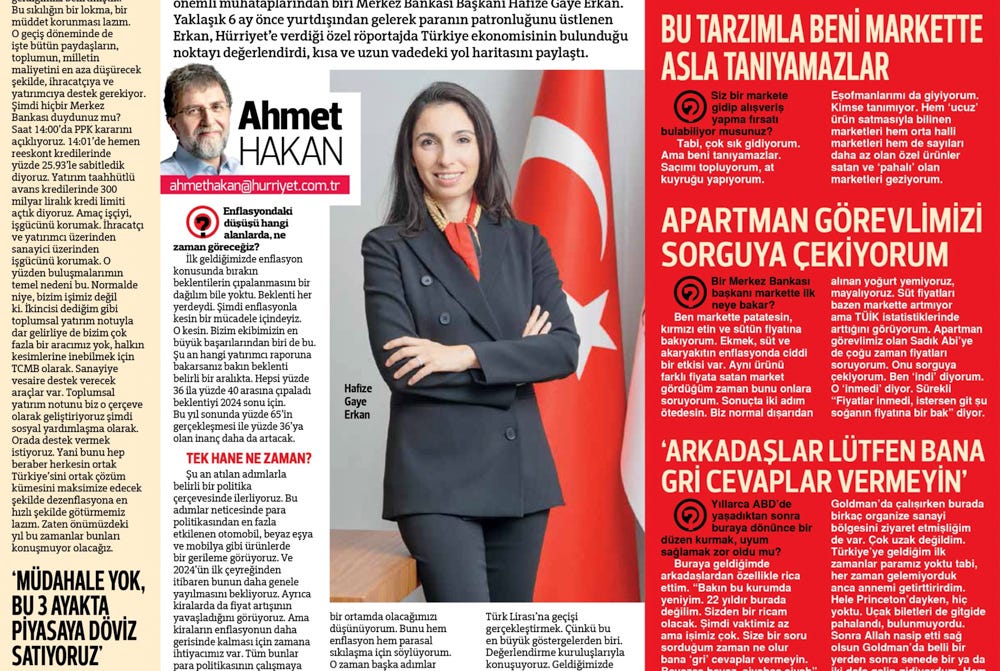The year-end is near, and you can go out with a head bang – like the "Rapunzel" tarikatı – or a thumper – like this highway tunnel rave. Choice is yours, don’t regulate.
In this week’s issue:
CB raises rates and Erkan’s profile
Erdoğan visits Budapest
Sweden’s NATO bid looms large
Turkey denies Hamas financing claims
CHP mayors handle Akşener heat with gloves
Foul melee plagues Süper Lig
And check our reports on environmental underfunding and underspending by Eray Görgülü and the elusive NATO vote in the Turkish parliament by Diego Cupolo.
Holiday note: We’ll be off next week, but will be back in your inboxes Jan. 4 with a special 2024 predictions issue. Happy holidays and a happy new year to all!

Rental prices in Turkey are surging, topping the list among OECD countries. Although recent market research showed a slight downward trend in the past months, finding affordable housing remains a growing problem, especially in İstanbul where average rental rates surpass the minimum wage.
As access to credit becomes more challenging with increased interest rates – and the latest hike today (Thursday) by 250 basis points to 42.5 percent as anticipated – many citizens have to rely on renting flats rather than buying them.
According to recent TÜİK data, house sales have dropped this year across the country. The burden is very much on lower-income groups, and it turns out the Turkish CB head is feeling it, too.
In a celebrity profile-style interview with the pro-gov Hürriyet newspaper last weekend, Hafize Gaye Erkan shared her take on Turkey’s economic situation.
Apart from personal hints about her go-to grocery look (a messy bun and sweatpants for those wondering) and shopping list, the interview revealed astronomical housing prices had led Erkan to move in with her mother, a news item picked up by international media.
The claim came under scrutiny, as Erkan benefits from lodging in Ankara with expenses covered by the state. Another article surfaced, raising allegations of nepotism in the arrangement of her interview.
In time, Erkan’s statements sparked major criticism as her choice of interview medium was questioned, and her attempt to empathize with the economic crisis was found to be insincere.
“The heads of such technical institutions, while directing the markets and informing the public, should speak in a basic and open manner,” Enes Özkan, Daktilo1984 chief editor and economist, told Turkey recap, adding her speech was more political than bureaucratic.
“I don’t understand why she aimed to present herself as ‘halktan biri gibi’. If you really want to show support, you have to prevent people from losing money to inflation.”
Though she was appointed in June to reverse damage caused by Erdoğan’s unorthodox “lower interest rates = lower inflation” theory, Erkan credited the president for the CB policy shift and went on to say the CB would support industries upon the president’s guidance.
This fueled debates on the CB’s institutional framework and independence, which critics have long seen as serving the government instead of the public.
“The president's desires and wants are preferential over ours. They know they should be accountable, but they aren’t,” Özkan said, adding Erkan’s past experience in investment banking also runs counter to the CB’s working principles.
“Central bank heads’ main constitutionally defined duty is to foster de-inflation and maintain price stability. They are not in the position to lift up certain industries, nor have the necessary resources to do so,” he added.
“They can’t give industrial credits or anything like a credit institution. The major tool the Central bank has is defining the policy interest rates to steer the entirety of the market.”
Meanwhile, recent monetary tightening moves have increased foreign investor interest in Turkish bonds – which recently peaked from all-time lows to $2.4B. Total CB reserves also reached a record-breaking $141B with steep increases since June.
As for inflation, the CB projects a decline to single-digit levels in 2026. But Özkan warned:
“Tackling inflation is not something that can only be done with monetary policy tools. There are also factors such as fiscal policies, political stability and international investments. Unless these are in place, it does not seem possible to bring inflation down to single digits,” he told Turkey recap.
MIT Economics Prof. Daron Acemoğlu shared similar views with Sözcü, saying that decreasing inflation will not be sufficient to salvage the Turkish economy.
And all of this comes as minimum wage discussions continue, with no decision yet from this week’s round of meetings. There are various speculations about the rate of potential wage increases, but all raises will eventually translate to more price hikes in the coming months.
Until then, consumers are finding their own violent solutions to tackling high inflation – which we definitely do not recommend – and debt collectors are learning these kung-fu moves as a precaution.
– Verda Uyar
Keep reading with a 7-day free trial
Subscribe to Turkey recap to keep reading this post and get 7 days of free access to the full post archives.



